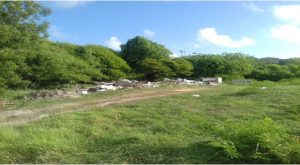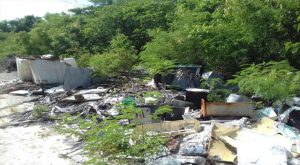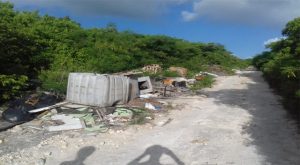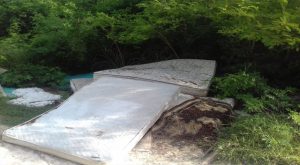 Growing concerns over rampant and out of control, illegal dumping has led to calls for a change in strategy, with suggestions ranging from militarising enforcement to incentivising proper disposal.
Growing concerns over rampant and out of control, illegal dumping has led to calls for a change in strategy, with suggestions ranging from militarising enforcement to incentivising proper disposal.
Chief Health Inspector Lionel Michael said the current strategy has been tried for almost 15 years without success.
“In 2002 Observer Radio and other NGO’s spearheaded a massive clean-up and we appointed 75 litter prevention wardens. Of those 75 litter prevention wardens that we appointed in 2002, not one has brought a charge against anybody,” Michael said.
His recommendation is for a stricter enforcement approach.
“It is a violent activity, it is a risky activity, when it comes to enforcing litter laws, so my recommendation is to militarise it, give it to the police and give it to military to apprehend and charge people,” Michael added.
Health and Environment Minister Molwyn Joseph has promised the biggest-ever national cleanup campaign with preliminary survey work currently underway.
“We have received the budgetary allocation to undertake this exercise. It will represent the largest cleanup effort that we would have ever seen in Antigua and Barbuda, which will include all 16 constituencies as well as Barbuda,” Joseph said. “We hope to start early October, and it will end when we have cleaned the country”.
The minister is also promising harsher penalties under a new Litter Act, but General Manager of the Antigua Hotels and Tourist Association Neil Forrester suggests a softer approach may yield greater results. “We have seen more and more illegal dumping since the introduction of tipping fees at Cooks (Sanitary Landfill) Dump. Weatherills used to be a pristine corner of the island, and if you go in there now it’s absolutely disgusting,” Forrester said.
 “If we really want to solve the problem we really need to look at the financing of the dump and encourage people to take the garbage there at no cost rather than tipping it anywhere and everywhere to avoid paying,” he added.
“If we really want to solve the problem we really need to look at the financing of the dump and encourage people to take the garbage there at no cost rather than tipping it anywhere and everywhere to avoid paying,” he added.
The hotelier argued the scourge of illegal dumping is hurting the nation in lost tourism revenue. “Maybe National Solid Waste or the CBH (Central Board of Health) need to look at a different revenue stream to facilitate the cleanliness of the island, because we could be charging, trying to get some revenue from the waste side, but in the end we will be losing it from the tourism side,” Forrester said.
Environment Minister Molwyn Joseph however said the revenue from tipping fees cannot be sacrificed.
“I cannot say I agree with that because the landfill is providing a service. We have to pay the workers down there. We have to pay the heavy-duty equipment to handle the waste that is taken to the landfill every day. And, by the way, I would say approximately 60 per cent of people do their best in paying the tipping fees and everything in Antigua cannot be free,” Joseph said.
The minister argued education is more important than scrapping tipping fees. “I don’t really believe that is the issue. I think frankly most of these infractions result from callous people who have no respect for the environment, and I think perhaps an education programme would be more effective than removing tipping fees,” Joseph said.
“I don’t really believe that is the issue. I think frankly most of these infractions result from callous people who have no respect for the environment, and I think perhaps an education programme would be more effective than removing tipping fees,” Joseph said.
Tipping fees at the Cooks Sanitary Landfill are EC$54 per ton for commercial, industrial and institutional waste, EC$5 per ton for construction waste and EC$108 per ton for cruise ship waste.
